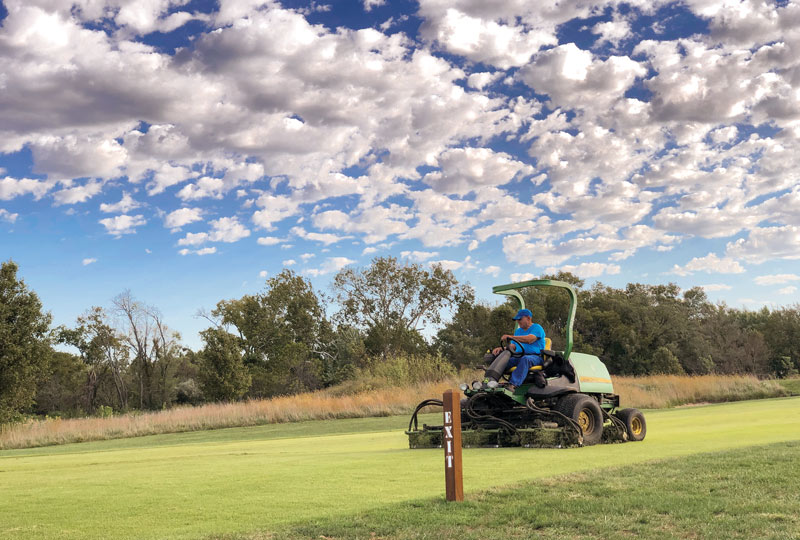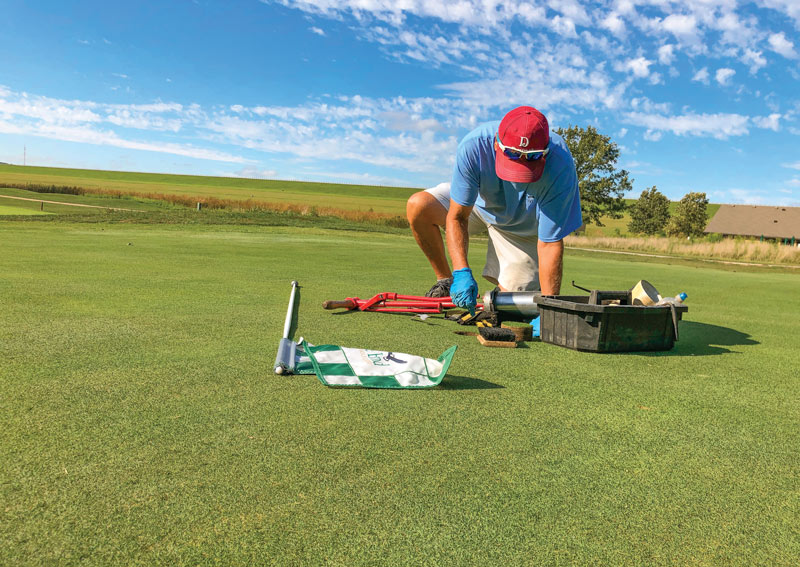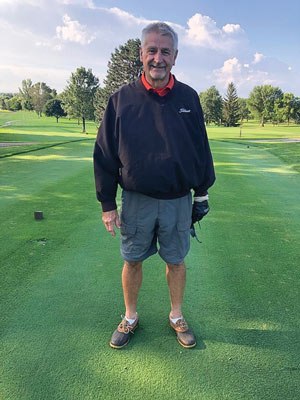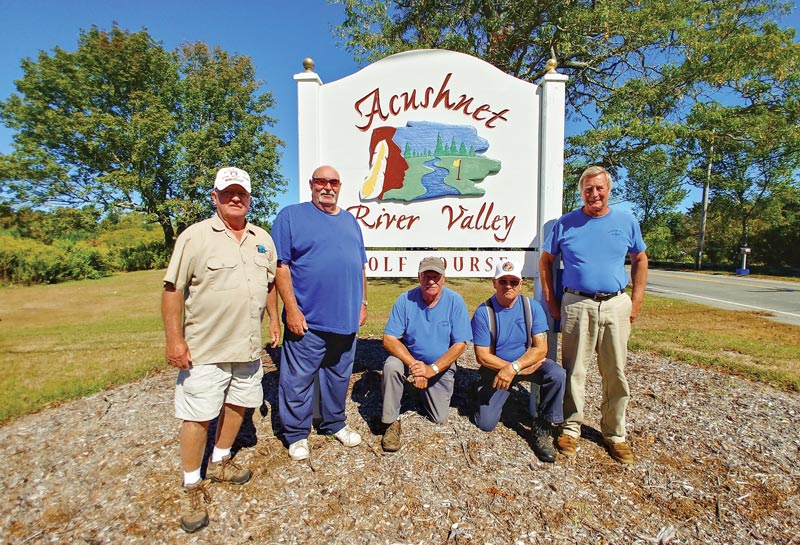
Gary Pearson, 75, has mowed fairways for his son — GCSAA Class A superintendent Darin Pearson, at Eagle Bend Golf Course in Lawrence, Kan. — since Gary’s retirement 10 years ago. Photo by Andrew Hartsock
Just a few short years ago, at his previous stop during a long career as a golf course superintendent, Darin Pearson made full use of high school laborers.
Pearson, GCSAA Class A superintendent and park operations manager at Eagle Bend Golf Course in Lawrence, Kan., proudly recalls his “Mowboy Workforce.” He remembers the high schoolers — plucked from the local prep football teams — wearing cleats to push-mow all the course’s green banks and tee banks.
Then Pearson moved across town to Eagle Bend, and that source of strong-backed labor largely went away, as Pearson was prohibited from employing anyone under the age of 18. Now his staff members are more likely to be wielding a weathered AARP card than a newly minted driver’s license.
“We’ve evolved to that,” says Pearson, a 25-year GCSAA member. “It’s funny how we have. We wouldn’t have dreamed it. When we had an opening, we used to have an inch to 2 inches of applications, and now it’s nothing. Honestly, I don’t know how we’d survive without our retired workers.”
Historically low unemployment and a host of other factors have created a potentially catastrophic labor crisis across the golf course maintenance industry, and superintendents have been forced to get creative to fill their staffs.
One such creative solution: tapping into retired workers, though that’s a bit of an oxymoron, as Chuck Wolsborn, GCSAA Class A superintendent and owner at Gresham (Ore.) Golf Course, is quick to point out.
“I don’t like to think of them as retired,” says Wolsborn, a 26-year association member. “They’re working. They’re working for me.”
And they’re working quite well.
“We’ve had good experience with retired workers,” Wolsborn says. “They generally want to work during retirement, and they’ve developed a work ethic where they want to work instead of having to work. They’re generally flexible on hours. We’ve had very good experience with them.”
Wolsborn is not alone. In a recent GCSAA member survey about labor, 85% of respondents said they had employed retired workers on a seasonal and/or part-time basis. Just 4% said they would not consider employing retired workers. And in rating how successful various sources of labor are at meeting labor needs, retired workers tied — with H-2B workers, or temporary nonimmigrant foreign laborers — for the top spot.
“They show up to work,” says Stephen Tibbels, CGCS, superintendent at Acushnet River Valley Golf Course in Acushnet, Mass., and a 30-year GCSAA member. “They enjoy working here, and they’re here on time. They’re always on time. As a matter of fact, they’re always early. I don’t know how best to describe it, but these folks just know responsibility. It’s hard to find the traits retired workers have in the more recent generations.”
Tibbels has five semiretired workers on his staff, four of whom have been on staff for more than a dozen years.
“I have them do just about anything,” Tibbels says. “The only thing I don’t have them do is physical work. That’s not something I think they should be doing. But they want to do a good job. I don’t think, after they understand what we want done, I don’t think I’ve had to go back and say, ‘We need to do this over. We need to be better at that.’ They make my job easier.”
‘Labor has gotten so tight’
The use of retirees to help out around golf courses is not exactly novel.
Enticed frequently by the lure of free or discounted golf, golden-agers long have been found on course serving as marshals and starters.
All the way back in 1987, when Darin Pearson was starting down this career path at Lake Perry Country Club in Ozawkie, Kan., “Our mechanic was a retired guy,” he says. “The guy who mowed our rough was a retired guy. That’s all I’ve ever known. But has it evolved? Absolutely. We’ve had to increase our numbers. Labor has gotten so tight, compared to where we were 10, 12, 15 years ago. And it feels like every year it gets tighter. Guys don’t want to slice chemicals, so you slice labor. It’s the easiest place to slice.”

Greg Wyatt, 64, half-jokingly refers to himself as Eagle Bend Golf Course’s “hole location specialist.” He retired just over two years ago from a 40-year career with the Kansas Department of Transportation, but has worked part-time on various golf courses for more than two decades. An avid golfer, Wyatt unashamedly says he works on courses so he can save money on playing them. Photo by Andrew Hartsock
Pearson says he employs three semiretired workers full time on the maintenance staff for eight months of the year, with three others almost full time. In peak season, he might employ close to a dozen retirees — including his 75-year-old father, Gary, who has worked for his son since Gary’s retirement 10 years ago.
“Most of our mowing is all retired guys,” Darin Pearson says. “They’re so dependable compared to the younger generation. They’re always going to take care of your equipment. You do have to make sure you have enough kids to sod and do tree pruning, too. You wouldn’t ask a retired guy to do that. When we need strong backs, that’s what we have college kids for.”
Retirees: Reliable, early risers
Jim VonAhn, CGCS, a 31-year GCSAA member at Carroll (Iowa) Country Club, has had similar luck with second-career workers.
“The thing about retired workers is, most of them don’t mind getting up early,” he says. “They don’t want to work weekends. That’s one of the downfalls of retired workers. Over the years, we’ve had a few who’d come in one morning and say, ‘We’re going to spend two weeks with the grandkids.’ What are you going to do? Fire them? They already quit once. But that’s the only downside. They’re pretty independent, and very dependable also. You don’t have to worry about them going out and partying at night.”
VonAhn says he employs three regular part-time retirees throughout the season.
“With the younger generation not wanting or having to work,” he says, “we rely on them pretty heavily.”

VonAhn’s case is a bit unusual, maybe even unique. One of those retired guys he relies on is Dan Smith (right), a retired GCSAA Class A superintendent and a 35-year member of the association who was the superintendent across town at Carroll Municipal Golf Course. The Iowa GCSA’s Superintendent of the Year in 1990, Smith retired on Dec. 31, 2015, after 30 years at Carroll Municipal.
“Before he retired, he asked if he could work out here,” VonAhn says. “I said, ‘Just name your hours and days.’ He can mow greens and tees and fairways … anything we ask him to do. I’m the luckiest superintendent in Iowa.”
Skill set carry-over
Not every superintendent with an opening is going to have a decorated, retired golf course maintenance veteran walk in the door.
Still, he or she might land somebody who acquired a skill in a previous career that can carry over.
“Down here, in central Illinois, we’re more rural-based,” says GCSAA Class A superintendent Andrew Decker, an 11-year association member who has been superintendent at Effingham (Ill.) Country Club for the past three years. He moved to Effingham from the Chicago area. “The pool of employment is significantly smaller. I have some retired plumbers, retired factory workers, guys who farm who just want to pick up extra hours. All of those guys are good operators. They’re going from a tractor in the field to a tractor going down the fairway or mowing rough. It’s just a matter of explaining to them what the goal is. They can get on it and operate it.”
Tibbels has employed a retired master welder (“He could make anything,” Tibbels says) and a former house builder (“He does all our carpentry work”).
One of Wolsborn’s workers retired from a long career at ... Rain Bird.
“That was extremely fortunate,” Wolsborn says. “When he retired, he wanted to spend some time on the golf course. He has made some significant improvements to the irrigation system. Some seniors don’t play golf, but they do have some past life experiences. They might have an idea that’s not from a related field but can apply that here. They have a wealth of knowledge and can share that different perspective.
“I have an individual I’ve known since grade school. He was a truck driver and contractor. He has a wealth of experience in concrete and wood structures. He mows and changes cups. When we need to do bridge repairs, it’s turned over to him.”
For Decker, there are some tasks he won’t turn over to his senior staffers.
“The biggest thing is just managing their physical ability,” he says. “I’ve got guys pushing 70. It’s hard for me to say, ‘Go ahead and weed-eat.’ But they’re so dependable and so responsible. If something breaks, they take it right to the mechanic. I love having them.
“I have two brothers. One is 72, and one is 69. I consider one of them my second mechanic. They’re the first ones here, and they would be the last to leave if I didn’t kick them out at the end of the day. But the day is coming I’ll have to replace them.”
Why retirees do it
So why would a retiree trade nice, easy golden years for a second career on course? Free golf isn’t always the answer.
“Some of them probably need the income,” Decker says. “To be honest, not a single one of my guys does it for the golf. I thought guys would figure they could work on a grounds crew and that’d get them in to play golf, but I don’t have a single one of those guys. A lot of them worked their whole lives. They don’t want to just sit around.”

The semiretired crew of Acushnet River Valley Golf Course in Acushnet, Mass., from left: Richard Bielefeld, Everett Hardy, Conrad Tetreault, Albert Jeronymo and John Dietlin. The five account for 56 years of service to the course and the town of Acushnet. Photo by Stephen Tibbels
“We don’t like to be too liberal with that (free golf),” Wolsborn says. “In some cases, you’re getting an employee but losing a paying customer. In most cases, it has worked out real well. We appreciate the work, and they appreciate the benefit of playing golf.”
Which brings us back to Pearson. He admits most of his semiretired workers do it for the golf.
“We let them really work a lot of their own hours,” he says. “They like to play golf. That’s why they’re here, the social part of golf. That’s the main thing. If Monday is senior league, we know Monday morning we’re not going to get too much help out of them, or they come in early and work for us and go play golf at 8:30 or 9. You have to be flexible on that. But it’s easy because they’re so dependable.”
Pearson even has a tidbit of advice for any superintendent planning to dip into the retiree labor pool.
“Do the upgrade on the air-ride seats,” he says with a hearty laugh. “Make sure you get a comfortable seat for them — make it so they can get on and off the mower — and you’ll have a good operator.”
‘I’m in it for the golf’
Greg Wyatt put 40 years into his first career. With a considerable amount of overlap, he’s about halfway to that in his second.
Wyatt worked just over four decades for the Kansas Department of Transportation, mostly as a bridge inspector. An avid, competitive golfer, he started working weekends on a handful of courses in northeast Kansas, the past three years or so at Eagle Bend Golf Course in Lawrence.
“I love golf,” says Wyatt, 64. “This place is special. There are no houses. It’s beautiful out here, and we’ve got a lot of wildlife. And I’m a morning guy. I just like the work. My passion is golf, and this went hand in hand.”
There’s one other perk that drew Wyatt and that has kept him toiling away: the prospect of free golf. A few years ago, when he worked at what was then Alvamar Country Club for then-superintendent Darin Pearson, Wyatt approached the boss — with whom he has been reunited at Eagle Bend — and inquired good-naturedly about a bump in pay.
“I kept going, ‘I need a raise,’” Wyatt says. “I’m not in it for the money. I’m in it for the golf. But I’d ask for a raise, and (Pearson) would go, ‘As much golf and golf cart and range balls as you use and play, you’re probably making 40, 50 bucks an hour.’ And I go, ‘Well, I can’t argue with that.’”
In season, Wyatt works around four hours a day, four days a week prepping the course — primarily setting hole positions, cutting cups and managing detail work, trash and bathrooms.
Once the weather turns, he’ll cut back to weekend hours.
“Once I go to weekends, I can make the frost calls so the superintendents don’t have to come in on weekends,” Wyatt says. “I’ll check the pump stations, make a tour of the golf course, make the frost call if the golf course is still open.”
Pearson can’t begin to quantify Wyatt’s contributions to Eagle Bend.
“Am I lucky to have a guy do what Greg does? Yeah. Greg’s incredible,” Pearson says. “The thing with Greg, he’s been doing it long enough, I can trust him with anything. I can trust him to get soil moisture readings. He sees things maybe some 18-year-old wouldn’t see. A lot of places maybe do have an assistant. Greg is like an assistant to us, and we couldn’t do it without him.”
Someday, Pearson might have to. But, Wyatt says, that day isn’t close.
“I’m still in pretty good shape,” he says. “Physically, I’m still able to do it. I carry that little knee-saver pad. But I’ll do it as long as my body will let me. I usually don’t work out in the summertime. This usually keeps me in shape. My knees don’t really bother me here. I probably hit my 10,000 steps by 9 o’clock. I’m getting my exercise.”
Andrew Hartsock is GCM’s managing editor.